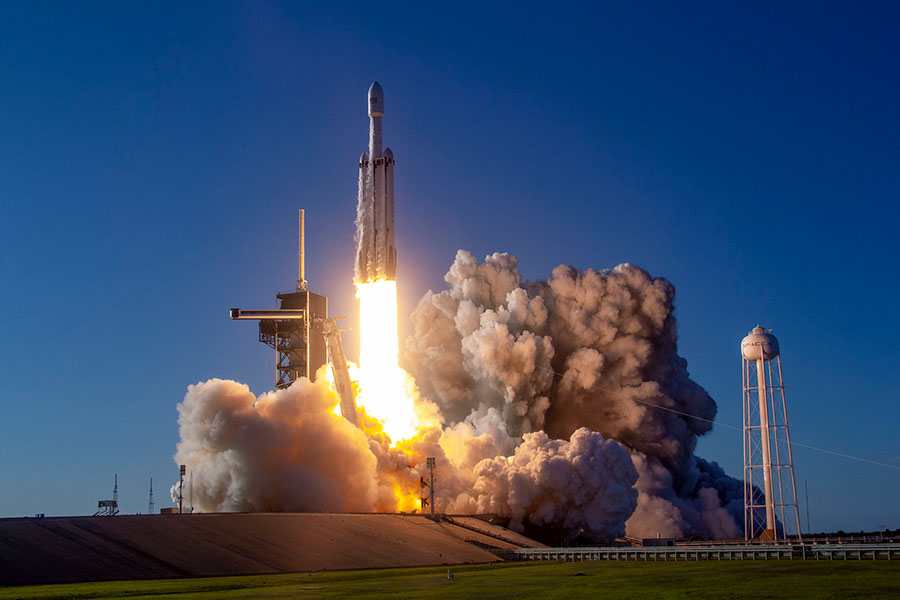Hey guys! We’ve just hit 4 million subscribers,
嘿,小伙伴们大家好!好消息,我们的粉丝已经突破400万啦,
and we wanted to thank you for all the support over the years.
在这里,要特别感谢大家一直以来的支持。
And for this special occasion, we’re going to continue to do what we do best
在这个特殊的时刻,我们将继续尽我们最大的努力,
and break down the science we know you all love so much!
把大家都十分喜爱的科学知识分享给大家!
Thanks again for all the support!
再次感谢大家的鼎力支持!
In recent years, rocket launches have recaptured the public’s imagination.
近年来,火箭发射再次吸引了大家的想象力。
Thanks to incredible footage of reusable rockets like Space-X’s Falcon 9 and Blue Origin’s New Shepard
多亏了记录了Spece-X的猎鹰9号和蓝色起源的新谢泼德号
making almost unreal-looking landings on landing pads and drone ships,
等可回收式火箭发射的那些相当棒的视频资料,
a rocket launch has become must-see Internet TV.
火箭发射已经成了这年头大家必看的网络节目。
They even pull zany stunts,
它们甚至还学会了搞怪,
like Elon Musk launching an electric car into space and announcing he hopes to put a million people on Mars.
比如,伊隆·马斯克将一辆电动汽车送入太空时就宣布,他希望有朝一日能送100万人到火星上去。
That’s a lofty goal, pun intended,
可以说是非常宏大的目标了,注意,这是个双关,
and to achieve it, we’re going to have to launch a lot of rockets,
要达到这个目标,我们就得发射很多火箭,
much more than the 80 or 90 we currently do each year.
发射频率得比我们现在每年80或90枚的频率大得多。
If rate of launches climbs, pun intended again,
如果真的把发射频率搞上去了,还是双关,
has anyone considered what all those rockets are doing to our environment?
那么,是否有人想过,那些火箭会对我们的环境造成怎样的影响呢?
Rockets work by burning propellant, and lots of it.
火箭靠燃烧推进剂,燃烧大量的推进剂向前推进。
Instead of like the engine in your car, which burns fuel to make gasses expand,
和汽车的动力系统不一样,汽车靠的是油料燃烧产生高温气体,气体膨胀,
which pushes a piston which turns a shaft which ultimately turns your wheels,
推动活塞,活塞带动轴承,轴承再带动车轮向前行驶,
rockets skip all that middle stuff and just jump straight to lighting fuel on fire,
火箭省掉了中间的所有步骤,直接跳到点燃燃料,
pushing themselves forward using the expanding gases that are shooting out the back.
让从火箭尾部喷出的膨胀气体推动自己前进。
As you might imagine, this uses tons of fuel.
可以想见,火箭会用到大量的燃料。
So much so that over 95% of the mass of most rockets is just fuel.
所以,大多数火箭燃料的质量都占到了火箭总质量的95%以上。
What does burning that much fuel mean for something like global warming?
燃烧这么多的燃料对全球变暖之类的问题意味着什么?
How much CO2 does one rocket launch emit?
发射一枚火箭又会排放多少二氧化碳?
We could actually figure that out with the power of math.
这些问题我们都能用数学计算出答案。
No don’t go, I promise it’ll be simple.
别,别走,我保证会很简单的。
Let’s take the most powerful rocket there is right now,
我们就拿目前最厉害的火箭为例,
Space-X’s Falcon Heavy, which is basically 3 Falcon 9’s duct-taped together.
那就是Space-X的猎鹰重型火箭,基本上就是把3个猎鹰9号绑在一起组成的一个火箭。
Falcon Heavys use liquid oxygen and a rocket fuel called RP-1, which is highly refined kerosene.
这款火箭使用的是液氧和一种叫做RP-1——一种高度精炼的煤油做燃料。
Nearly 86% of RP-1's mass is carbon, and SpaceX doesn’t publish specifics,
而碳元素占到了RP-1质量的近86%,虽然SpaceX没有公布具体数据,
but a rough estimate of a full tank of gas for the Falcon Heavy is about 425 metric tons of RP-1.
但粗略估计,猎鹰重型运载火箭满满一箱油里大约含有425吨RP-1。
That’s about 365 tonnes of carbon per launch.
这就相当于一枚RP-1就有约365吨的碳。
Let’s assume all that carbon combines with oxygen to form CO2.
假设所有这些碳最后都和氧结合形成二氧化碳。
Carbon makes up 27% of the mass of CO2, so divide that 365 tonnes of carbon by 0.27
碳元素占二氧化碳质量的27%,用365吨碳除以0.27
and you get nearly 1,352 tonnes of carbon dioxide per launch, give or take.
可以算出,每次发射大约会产生1352吨二氧化碳。
By comparison, a typical passenger car emits 4.6 tonnes of CO2 annually,
相比之下,一辆普通轿车每年会排放4.6吨二氧化碳,
so one rocket launch is the equivalent of nearly 294 cars on the road for a year.
也就是说,发射一枚火箭相当于294辆汽车在路上行驶一年排放的二氧化碳量。
That… doesn’t seem so bad actually.
事实上……这样的污染似乎算不上太严重。
Even if we launched one Falcon Heavy, the most powerful rocket currently flying remember,
即便我们每天发射一枚猎鹰重型火箭,这是目前最强大的火箭还记得吧,

every day for a year that would still emit less CO2 than 110,000 cars.
连续发射一年,产生的二氧化碳仍然少于11万台汽车产生的量。
There are over 270 million registered vehicles in the U.S. alone, so that’s a drop in the bucket.
而美国的注册车辆就有超过2.7亿台,所以,火箭产生的二氧化碳真的算少的了。
And that’s assuming all the fuel is used completely.
这是假设所有燃料都用完了的情形。
The real environmental issue is rockets aren’t that efficient.
而火箭真正破坏环境的地方在于它的燃烧效率并没有那么高。
RP-1 that doesn’t completely burn forms chains of hydrogen and carbon.
RP-1燃烧不充分就会产生氢和碳链。
These dark sooty particles are known as black carbon, and in the atmosphere they can trap incoming heat.
这些乌黑的颗粒被称为“黑碳”,它们能够锁住进入大气层的热量。
In the stratosphere, this heat can speed up reactions and lead to the breakdown of ozone particles,
在平流层,被锁定的热量会加速物质之间的反应,导致臭氧颗粒的分解,
depleting the ozone layer and exposing us down here to more UV radiation.
继而破坏臭氧层,使我们暴露于更多的紫外线辐射之下。
Along with black carbon, RP-1 produces nitric oxide and nitrogen dioxide,
除了黑碳,RP-1还会产生一氧化氮和二氧化氮,
which are highly reactive and further break down ozone.
这两种物质都容易发生反应进一步分解臭氧。
But before you get mad at Elon Musk,
但你生埃隆·马斯克的气之前,
just remember that different fuels produce different pollutants, and some are much worse for the ozone layer.
请记住,不同的燃料会产生不同的污染物,而有些污染物对臭氧层的危害格外的大。
The chlorine-based fuel used in the Space Shuttle’s solid rocket boosters utterly obliterates ozone.
比如,航天飞机的固体火箭助推器使用的氯基燃料就能够彻底臭氧层。
Solid propellants also produce more alumina,
固体推进剂产生的氧化铝也更多,
which is a shiny particulate that could reflect heat back into space,
氧化铝是一种闪亮的微粒,它既能将热量反射回太空,
but could also trap outgoing heat from the planet’s surface,
也能锁住行星表面散发出来的热量,
so we don’t know the impact it would have on climate.
所以,我们并不知道它对气候造成的影响。
That’s really the theme here,
这才是本视频的核心思想,
we just don’t know enough to say for sure what mass rocket launches would do to our planet.
我们知道的还太少,根本就无法确定大规模发射火箭会对我们的星球造成怎样的影响。
Companies keep rocket data confidential,
公司对火箭发射的数据都是保密的,
so the data we have is mostly from lab experiments, modeling,
所以我们的数据主要来源于实验室实验,建模,
and a few sensor-equipped planes that flew through rocket plumes about 20 years ago.
以及差不多20年前的几架装有传感器,穿越过火箭羽流的航天飞机。
We may feel that we don’t launch enough rockets to be concerned with their pollution,
大家可能觉得,我们发射的火箭并不是很多,暂且不用考虑它们的污染问题,
but that’s what we thought about space junk before it became a major problem.
问题是,太空垃圾问题变严重之前,我们也是这么想的。
If we have more research and better data, we’ll have a better understanding of our impact on the planet.
有了更多的研究和更好的数据,我们就能更好地理解我们对地球的影响。
Some scientists are calling for just that before we make a final say on just how much rocket launches affect the environment.
在我们明确火箭发射对环境的影响之前,一些科学家已经在呼吁大家重视这一问题了。
So the next time you watch another live launch and impressive landing,
所以,下次观看发射直播和令人印象深刻的着陆时,
just keep in the back of your mind that more research is needed.
请记住,我们仍有待进行更多的研究。
Thanks for watching, don’t forget to subscribe because we have more videos, like Maren’s about just how big our atmosphere is.
感谢收看本期节目,不要忘记订阅我们栏目,因为我们还有很多其他的视频,比如Maren的这期“大气层到底有多大”。
Does the impact of rocket launches worry you
你有担心火箭发射引起的环境污染问题吗?
or do you think our focus should be on other environmental problems?
还是认为我们应该把重点放在其他环境污染问题上呢?
Let us know in the comments and I’ll see you next time on Seeker.
快在评论中告诉我们吧。下期节目再见啦。











